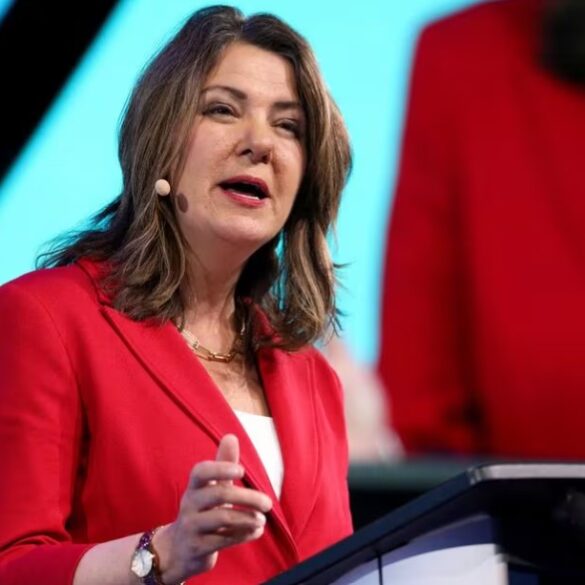
Alberta’s Premier Danielle Smith makes a keynote speech at the LNG 2023 energy conference in Vancouver, British Columbia, Canada July 13, 2023. REUTERS/Chris Helgren/File Photo

Ottawa is infringing on provincial jurisdiction with its federal dental plan—and Alberta wants no part of it, Premier Danielle Smith has announced in a letter to the prime minister.
Health-care planning and delivery is an area of provincial jurisdiction and the Canadian Dental Care Plan infringes on that right, Ms. Smith wrote in a June 25 letter to Prime Minister Justin Trudeau.
“If a new health program was to be developed by the federal government it should be done in full collaboration with provinces and territories and discussions should have occurred before these intentions [were] announced,” Ms. Smith wrote. “Unfortunately this did not occur. Alberta intends to opt out of the federal plan and maintain its provincial programs for Albertans.”
The province instead is asking Ottawa to negotiate an agreement for the province’s share of federal dental funding. This, Ms. Smith said, will be used to expand provincial dental coverage to more low-income Albertans.
Provincial and federal officials should be able to negotiate “mutually agreeable terms” within two years, allowing Alberta to opt out of the national dental plan by 2026, Ms. Smith said.
The chief reason for the opt-out beyond jurisdiction issues, Ms. Smith said, is the Canadian dental care plan replicates existing provincial coverage.
“This duplication raises the question of the value of maintaining two plans and whether health funding would be more wisely used to support a single plan,” she wrote. “Alberta has long maintained that it would be more effective to expand existing provincial programs than to introduce a new federal plan.”
The premier noted that, under the federal plan, “vulnerable children in care” would no longer qualify for dental coverage.
The Epoch Times contacted the prime minister’s office for comment but did not receive a response by publication time.
Ottawa has billed the dental program as a key part of its plan “to make life more affordable for Canadians.”
“A third of the people living in Canada do not have dental insurance, and in 2022, one in four Canadians reported avoiding visiting an oral health professional because of the cost,” the government said in a December press release. “Access to oral health care should not be dependent on Canadians’ ability to pay.”
Health Minister Mark Holland previously described the dental program as a necessity, saying it will be “transformative for our country.”
“It will significantly improve health outcomes, reduce a burden on our health-care system, and build a foundation of equity by expanding access to oral health care for the millions of Canadians that currently do not have access to this critical care,” he said.
National Dental Plan
The Canadian Dental Care Plan, which builds on the existing program for children under the age of 12, is expected to cost the government $13 billion for the first five years of its operation.
The plan is designed to help uninsured Canadians pay their dental costs, but it won’t cover the entire bill for all applicants. The program, which is open only to households with an income of less than $90,000, was created to be a co-pay plan based on adjusted family net income.
Those with an income of less than $70,000 will not have to co-pay, according to a government website. Those with a household income between $70,000 and $79,999 will pay 40 percent of service fees, while those with income between $80,000 and $89,999 will be required to pay 60 percent of the fees, the website shows.
Those who qualify for 100 percent coverage may still need to pay a portion of the bill if dentists charge more for procedures than the government has agreed to reimburse, or if they require a procedure that isn’t covered under the plan.
The dental plan is being implemented in phases. Currently, the focus is on enrolling eligible seniors. Those aged 64 and younger are not eligible to apply for dental coverage through the government’s plan until 2025.